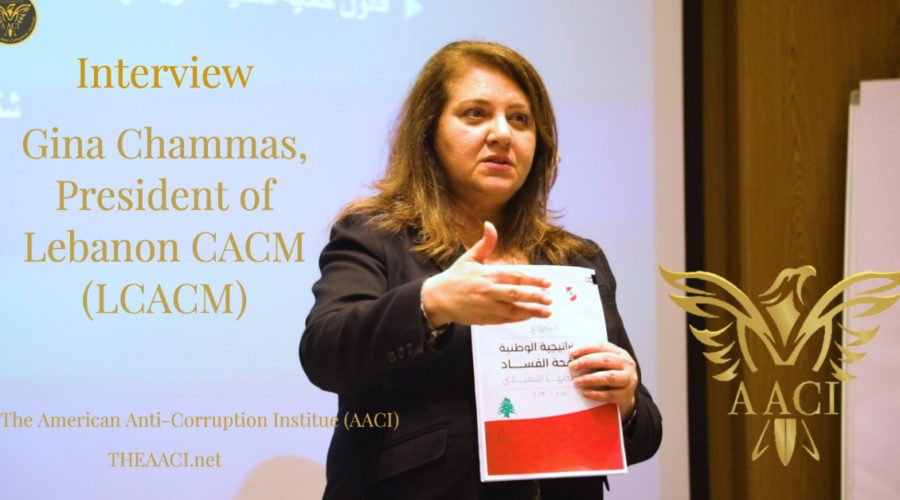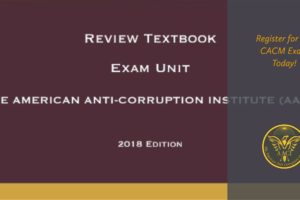February 28, 2021
Fighting corruption in Lebanon is different from any other country in the Middle East and Africa due to the complex political structure and the high levels of corruption. Though the economy has been deteriorating over the past several years, Gina Chammas continued leading the fight against corruption in Lebanon with high-level knowledge, professional skills, and integrity.

Mrs. Chammas is also a Sr. Advisor for The American Anti-Corruption Institute (AACI) in the MENA. She answered The AACI questions to share with all of us her experience, opinion, and advice to fight corruption efficiently and effectively in Lebanon and all over the world.
The ACCI: What does the Lebanon CACM (LCACM) stand for, and what are the drivers behind its formation?
Gina Chammas: There are many certification programs available in the world about corruption-related issues like Anti-Money-Laundering, Anti-Fraud, Transparency, and Accountability, Governance, etc… These certificates throughout decades till now, serve professionally in specific fields and enhance knowledge and comprehension in certain areas. The Certified Anti-Corruption Manager (CACM) Program is different, as it is the only one that encompasses all types of crimes of corruption. Once certified, many of us were inclined to want to share our knowledge with others and were motivated to properly define corruption-related problems and potential solutions for our country. After more than one year together, we formalized our efforts through a registered non-profit non-governmental organization. We named it Lebanon CACM (LCACM).
The AACI: What differentiates the Lebanon CACM from the rest of the other Lebanese NGOs that fight corruption?
Gina Chammas: Several important differences distinguish LCACM from any other anti-corruption NGOs in Lebanon. The certification requirement for any member of the executive board member, and therefore the association with The Lebanon Exclusive Strategic Partner of The AACI, and The American Anti-Corruption Institute itself, which is part of the legally approved bylaws.
The certification requirement for any member of the executive board member, and therefore the association with The Lebanon Exclusive Strategic Partner of The AACI, and The American Anti-Corruption Institute itself, which is part of the legally approved bylaws.
Another differentiating factor is the national strategy to fight corruption that includes several initiatives, such as University Initiative, that are decided upon and implemented by the LCACM relying on self-funding from the members.
Within less than a year from its formation, the LCACM announced two awards: The Corruption Fighter and The Integrity Dignity and Leadership (Idol) awards. LCACM initiated The First Anti-Corruption International Conference on Anti-Corruption in the region, which was successful.
LCACM is the only NGO that adopted the Ten Principles of Fighting Corruption issued by The AACI and that implements its own plan within the framework of the Ten Principles of Fighting Corruption.
LCACM’s bylaws allow for the membership of other NGOs that adopt the Ten Principles of Fighting Corruption issued by The AACI, to create a Forum welcoming all SERIOUS Lebanese NGOs that fight corruption.
The AACI: What are the challenges Lebanon CACM faces in Lebanon?
Gina Chammas: The biggest current challenge is financial, especially in light of the devaluation of the Lebanese Lira. Members excel in the fight when they are educated about corruption and ways to prevent, detect, and deter it.
More education and skills are needed to investigate and prepare evidence and pursue accountability legally for prosecution and asset recovery.
Education comes at a cost that is becoming inaccessible to most Lebanese, especially those who were victims of the banking sector, where they lost some of their savings in dollars since they are retained by the banks, or lost value of their savings in Lebanese Lira since the great inflation keeps increasing. Funding is also needed to prosecute based on evidence. Other challenges include continued access to the local and international media.
The AACI: How do you envision the Lebanon CACM role in raising public awareness about corruption and its damages?
Gina Chammas: LCACM plan includes the implementation of The AACI University Initiative spreading corruption prevention knowledge at the level of graduating students, as well as at the level of educating professors and university officials.
Empowering groups of CACMs within entities in both public and private sectors to enable them to redesign internal control processes and strengthen preventive controls, segregation of duties, documentation, reporting, and publishing. In addition, several published studies or articles, as well as a special report about measuring corruption risk is in the making.
The AACI: How important the role of youth, especially university students, is in preventing and deterring corruption? What do you plan to offer the Lebanese universities’ students to engage them in fighting corruption?
Gina Chammas: LCACM believes that fighting corruption efforts include two main parts: 1) Prevention: Preventing future or new corruption 2) Recovery: Investigating current and past corruption and pursuing those found to be corrupt based on reliable evidence. It is crucial to stop new corruption from occurring. Therefore prevention of corruption is a major part of the fight.
The best candidates for prevention are new generations, especially those with an interest in education. Once Certified as Anti-Corruption Fellows (CACF), most graduating students will act as a buffer against corruption and improve the society’s immunity against corruption seducing benefits. The Youth, who are immediately affected by the damages of corruption, as they look for jobs and face high unemployment rates, as they face favoritism and nepotism instead of competing competence, as they face high interest rates or impossibilities of securing even low-income housing, live the damages resulting from the corruption of previous generations. They are those who have the burden to break the corruption process for themselves and to protect the future of those following generations.
LCACM, acting in collaboration with The AACI through their current Lebanon Exclusive Strategic Partner, is offering the CACF review course at a subsidized rate for the e-book and review course with the option of taking the certification exam.
LCACM, acting in collaboration with The AACI through their current Lebanon Exclusive Strategic Partner, is offering the CACF review course at a subsidized rate for the e-book and review course with the option of taking the certification exam.
Courses are to include 500 students per session. Future leaders will certainly emerge and hopefully be better prepared to reduce the risk of corruption.
The AACI: What are the characteristics of the corruption fighter? What does it take to have corruption fighters?
Gina Chammas: Corruption Fighters are self-driven, determined, focused, and patient. They are able to see long term and they pursue a dream of a better community, a better society, or and a better country. They have internal discipline against corruption benefits as they see the damages in every proposition. Their personal identification with integrity and dignity is part of the makeup of their personality and reasoning. They are seekers of the protection of human rights and freedom for others most of the time at their own expense.
It might take oppression to light up the fire inside the fighter of corruption, but it also takes a high level of freedom in the spirit-born inside the fighter. On the other hand, education is a clearer easier path to success stories in spreading awareness and prevention measures and adoption of the Ten Principles of Fighting Corruption. Setting up a framework based on these principles improves the success rate of the fight and helps reduce the risk of corruption.
The AACI: The United Nations Convention against Corruption (UNCAC) is the only legally binding document that exists. Do you think that Lebanon implemented the UNCAC, though Lebanon signed on the UNCAC in 2009?
Gina Chammas: Lebanon ratified The UNCAC in 2009 and failed in all its government offices in implementing it to date. Unfortunately, such failure is also partly the responsibility of the advisors that assisted OMSAR on behalf of The UNDP. As little progress was made over 7 years and very slow progress over the 2 following years. It is only after the pressure put by the civil society including CACM members of The AACI, that progress speed picked up.
And after the Revolution that started in 2019, The UNDP and OMSAR realized the crucial stage the country is in.
LCACM is playing a crucial role in monitoring the progress and preparing for accountability where needed. LCACM will continue to play a critical role in pushing for compliance with The UNCAC in both public and private sectors, using the competence of its members as well as the public opinion clout that it has developed over the years.
The AACI: Does Lebanon CACM accept donations or support from foreign countries or individuals?
Gina Chammas: LCACM doesn’t accept funding from any foreign country or entity. LCACM encourages all Lebanese individuals preferably with an interest in fighting corruption in their own country, to donate funds and dedicate towards one or more of its specific initiatives and activities. All information related to funding will be submitted formally to the authorities and published accordingly on its website once donations are received.
The AACI: In your opinion, who is responsible for fighting corruption in Lebanon?
Gina Chammas: The government has the ultimate responsibility for fighting corruption in Lebanon. The Parliament is responsible for oversight to ensure that such activities are happening and well. Civil society is responsible for awareness building and encouraging compliance with the set rules.
The government has the ultimate responsibility for fighting corruption in Lebanon.
However, in light of the poor performance of the successive governments, the horrible oversight of the parliament on any issue within their jurisdiction, and the ineffective process used since 2009 in fighting corruption by OMSAR and The UN Staff and Advisors on the matter, LCACM finds itself engaged to fight corruption.
The AACI: Do you think that the international community is responsible for the financial meltdown of Lebanon and its financial system?
Gina Chammas: It is clear that the international community partnered with members from those in charge of governance who drove the financial systems into the ground.
The World Bank, The European Union, The United Nations Development Programs, as well as other funding programs, agreed to supply the Lebanese government with billions of dollars without Accountability.
The World Bank, The European Union, The United Nations Development Programs, as well as other funding programs, agreed to supply the Lebanese government with billions of dollars without Accountability.
- No annual financial statements were issued by the government as required by the Lebanese Constitution.
- No request for filing the comparative statements with the Approved National Budget to assess the actual deficit and the progress of very obvious and required controls to safeguard public property, public assets, and public funds within a framework of compliance with the Ten Principles of Fighting Corruption issued by The AACI.
- Year after year, not once was there a restriction from any international organization or funding organization due to the lack of accounting or publishing of financial statements of public entities.
- There was not one objection from any of them due to the absence of independent audit reports for state-owned enterprises or entities like Electricite du Liban regardless of the 2 billion USD spent annually on an entity that could not improve its production not even by 10% annually.
- Not one member of the international community questioned the independence of the same external auditors who issued for the last 25 years audit opinions on the financial statements of The Central Bank of Lebanon. Noting that most countries have limits on the number of years to retain the same auditors, like 9 years in most European countries and 5 years as a maximum retaining period in other countries.
On the contrary, most international organizations awarded the Governor of Banque du Liban “excellence” awards while his governing was in violation of The OECD requirements.
The Governor’s position housed the highest level of conflict of interest in any organizational structure in any democratic country in the world. The Governor of The Central Bank is also President of The Central Bank Council, and the President of the Capital Markets Association, and the Administrative Head of the Banking Control Commission, and the President of the Special Investigative Commission in charge of money laundering investigations and compliance with relevant money laundering articles in law #44. All in one position that has unsurpassed concentrated power that actually and strongly influences the Lebanese Banks Association.
All this without any objection or request for reform in this crucial sector. This definitely led to what is known as “power corrupts”, which resulted in the abuse of power by unilaterally redefining the role of the Central Bank Governor who extended additional funding to the government beyond what is required in the National Budget Law and without ANY legal basis, using the depositors’ funds available to the central bank through the banks’ deposits at the central bank.
Such abuse of power was also used to design and implement special financial schemes that are mostly based on the format introduced 100 years ago by Mr. Charles Ponzi, even though such models proved time after time their disastrous failure!
While the Government was supportive of such abuse and benefiting temporarily from the results before the meltdown, the Parliament stood actionless and did not safeguard the public’s interests. As a matter of fact, not once did the chair of the Committee on Finance and Budget at the Parliament refer to any comparison between the budgeted amounts and the actual amounts.
Not once did this committee address the audit report of the central bank financial statements to oversee the actual status of the bank accounts and balances of any of the public sector entities including ministries and other relevant public debt or funds donated.
All international organizations ignored compliance with a minimum level of regulation normally abided within their own countries.
All international organizations ignored compliance with a minimum level of regulation normally abided within their own countries.
The AACI: Finally, what is your advice for corruption fighters in Lebanon and all over the world?
Gina Chammas: First, don’t waste time, rush, and educate yourself in the field to increase the efficiency and effectiveness of your actions. Second, work in homogenous teams in terms of corruption prevention education levels and diverse disciplinary levels with a multi-sectoral approach. Third, adopt the Ten Principles of Fighting Corruption issued by The AACI as a framework to design well-balanced activities on a span of not less than 10 years, while allocating goals to achieve on an annual basis ending in an annual performance evaluation for future progress and improvement.
Corruption fighters need to agree to a plan that divides activities into two sections: Prevention and Recovery. Activities related to Prevention should be designed to include the youth, thinkers, writers, media, and most sectors like public health, financial, education, etc… part of these activities should target the technical part of internal control review, design, and proper implementation by CACM or CACEM experts in several sectors empowered to effect such system changes with smart use of technology. Activities related to recovery should be designed to include experts specifically trained in collecting evidence and documenting corruption cases and systems and abuses and preparing damage analysis and legal work required to pursue prosecution of those in charge of governance who abused their power AND to pursue the Recovery of Assets be it property or funds or other types of assets.
All actions should be well decided upon, within the independent mode outside any revenge-oriented mode, with high integrity and courage and good plans for the safety of both evidence and experts.
My last piece of advice is that fear is a good sign if used to improve your plan. Otherwise, it is a sign that you are not ready or missing crucial resources in your fight. Remember it is a war that only you can win when you follow the process with a well-trusted team, with a better country for next generations to enjoy, and never count on it for your generation!
The AACI: Thank you Gina Chammas. The American Anti-Corruption Institute (AACI) wishes you, LCACM, and your great country success and all the best.
Gina Chammas: Thank you.
###END###



















































